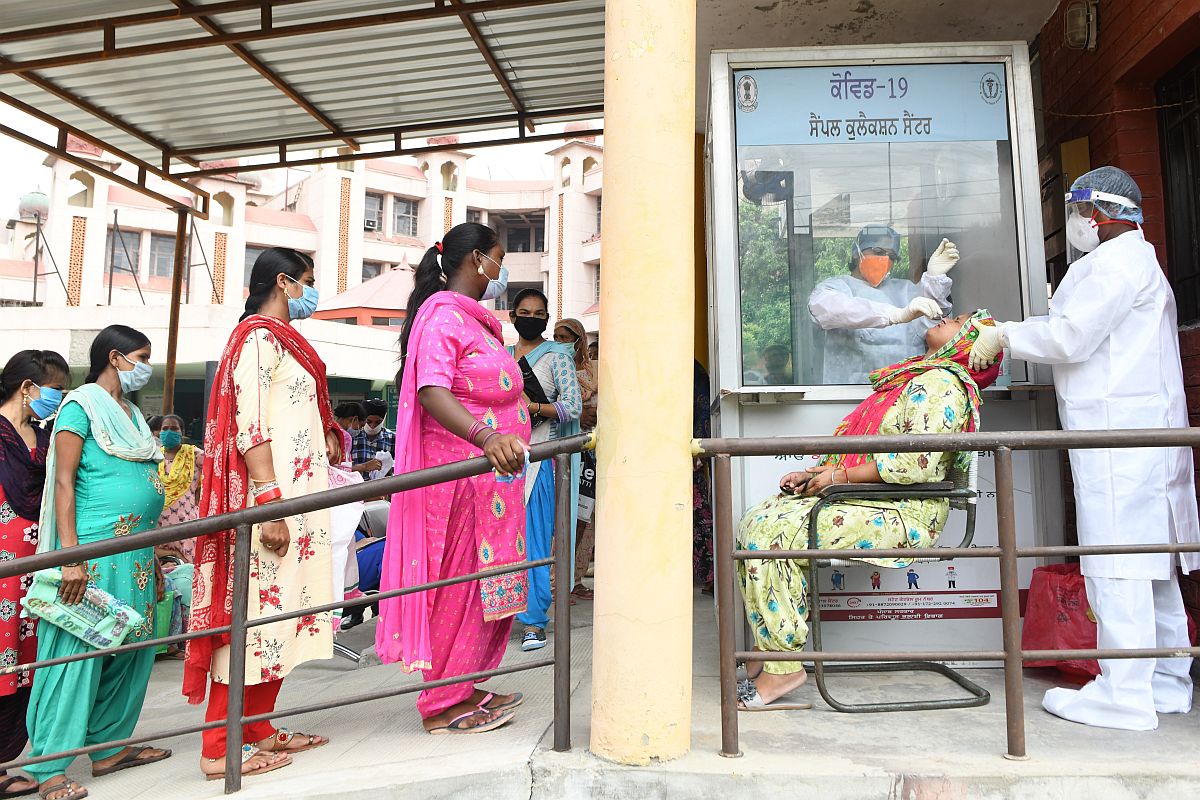India on Saturday reported the biggest single-day spike of 69,878 Coronavirus cases taking the tally to 29,75,702. As many as 945 fatalities were reported in the last 24 hours pushing the death toll to 55,794.
Of the total cases, 6,97,330 are active while a whopping 22,22,578 patients have been cured of the deadly infection that was first reported on January 30 in Kerala.
Advertisement
The recoveries saw the highest single-day rise of 63,631. Currently, the recovery rate currently stands at 74.69 per cent.
Meanwhile, India has crossed the the milestone of 1 million Coronavirus tests a day.
According to the Indian Council of Medical Research (ICMR), as many as 10,23,836 samples were tested on Friday, taking the total to 3,44,91,073 samples being tested till August 21.
However, India remains the third worst hit after the United States and Brazil in terms of cases.
Maharashtra, Tamil Nadu, Andhra Pradesh, Karnataka and Uttar Pradesh are the five worst-affected states in India by the outbreak.
Several states are announcing fresh restrictions amid a spike in cases.
In an attempt to curb the rising cases of the deadly Coronavirus, the Haryana government on Friday ordered all offices and shops in the state to remain shut on weekends.
However, movement of people will not be restricted in the state during weekends.
The move by the Haryana government came a day after its neighbour Punjab imposed weekend lockdown in the state.
Punjab Chief Minister Amarinder Singh on Thursday imposed daily night curfew, from 7 pm to 5 am and weekend lockdown in all 167 cities and towns starting Friday. The emergency measures will remain in force until August 31. The chief minister has also ordered a total ban on all gatherings in the state from August 21 except weddings and funeral.
Ahead of the Bihar election and the by-election on the vacant Rajya Sabha seat, the Election Commission of India (ECI) on Friday issued the broad guidelines in the wake of the Coronavirus pandemic.
With the outbreak of the pandemic, the ECI had sought suggestions of the National/State Political Parties for the conduct of elections.
As per the guidelines, a maximum of 1,000 voters can be present at any polling booth at a time, and every voter’s body temperature will be checked before the person is allowed to enter the booth.
Also, face masks, sanitisers, thermal scanners, gloves, face shields and PPE kits are a must during the electoral process ensuring social distancing norms. Hand gloves shall be provided to all the electors for signing on the voter register and pressing the button of EVM for voting.
Globally, the overall number of Coronavirus cases has topped 22.8 million, while the deaths have crossed 797,000, according to the Johns Hopkins University.
As of Saturday morning, the total number of cases stood at 22,864,873 and the fatalities rose to 797,787, the University’s Center for Systems Science and Engineering (CSSE) revealed in its latest update.
The US accounts for the world’s highest number of cases and deaths at 5,621,035 and 175,350, respectively, according to the CSSE.
Brazil comes in the second place with 3,532,330 infections and 113,358 deaths.
Meanwhile, Director-General of the World Health Organization (WHO), Tedros Adhanom Ghebreyesus on Friday said that the ongoing global Coronavirus pandemic could be over within two years.
Addressing a virtual press briefing from Geneva on Friday, the WHO chief said that the Spanish flu of 1918 had also taken two years to overcome, but current advances in technology could enable the world to halt the COVID-19 pandemic “in a shorter time”, the BBC reported.
“Of course with more connectiveness, the virus has a better chance of spreading,” he said.
The WHO chief reiterated that “COVID-19 is a once-in-a-century health crisis. But it also gives us a once-in-a-century opportunity to shape the world our children will inherit – the world we want”.











